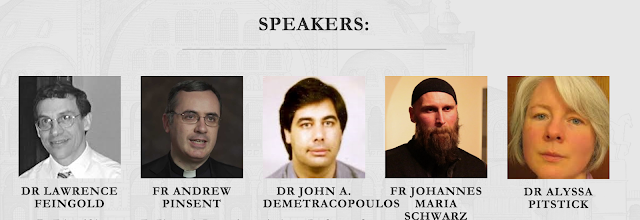The Dialogos Institute, an organization devoted to the study of the patristic heritage in the spirit of Latin and Byzantine Thomism (about which we have reported in the past) is holding its second colloquium 30th June - 1st July 2017 in Ramsgate, England. The topic is “Limbo” and the speakers are Dr Lawrence Feingold, Fr Andrew Pinsent, Dr John A. Demetracopoulos, Fr Johannes Maria Schwarz, and Dr Alyssa Pitstick.
The topic of Limbo is of particular importance to those who wish to defend the Catholic tradition, as it has come under particularly strong attack from modern theologians with novel views on grace. If eternal life is really an entirely gratuitous gift of God, which is given only to those who believe in Christ, then what of those who die without Baptism or Divine Faith, but who have never committed actual mortal sin? The overwhelming weight of the witnesses to Tradition is that such persons cannot enter eternal life, but rather descend to the underworld, without, however, receiving the punishments of those who died in actual mortal sin. The place of such souls is what has been called “Limbo”. (Cf. Rorate’s previous posts on topic, especially here and here). But modernist theologians, who think that there is a natural desire to enjoy the supernatural gift of the Beatific Vision, and that therefore Divine Faith in Christ can be implicit in the general intention to do good, claim that God gives eternal life to all such persons. The Dialogos Institute’s Colloquium will thus directly address some of the most important issues in the struggle between Tradition and (neo-)modernism.
As one of the organizers told Rorate, Ramsgate, where the Colloquium is to be held, is home to national shrine of St Augustine of Canterbury and the landing place of St Augustine himself, Hengest and Horsa, and of Claudius's legions. Eleven canonised saints have lived in the parish of Ramsgate and Minster and the Shrine of St Augustine is the burial place of its architect Augustus Welby Pugin the great convert to Catholicism and theorist of Gothic Architecture. Ramsgate is thus the recipient of St Gregory the Great's missionary zeal, the origin of Anglophone Christianity, the place where Benedictine Monasticism entered the English Speaking world, the origin point of the English Speaking World itself and the place where Britain was first incorporated into the Roman polity. A full-size longboat, the gift of the Kingdom of Denmark, stands above the sea a short distance from the Shrine of St Augustine while the extensive ruins of the Roman fortress can be visited at Richborough.
